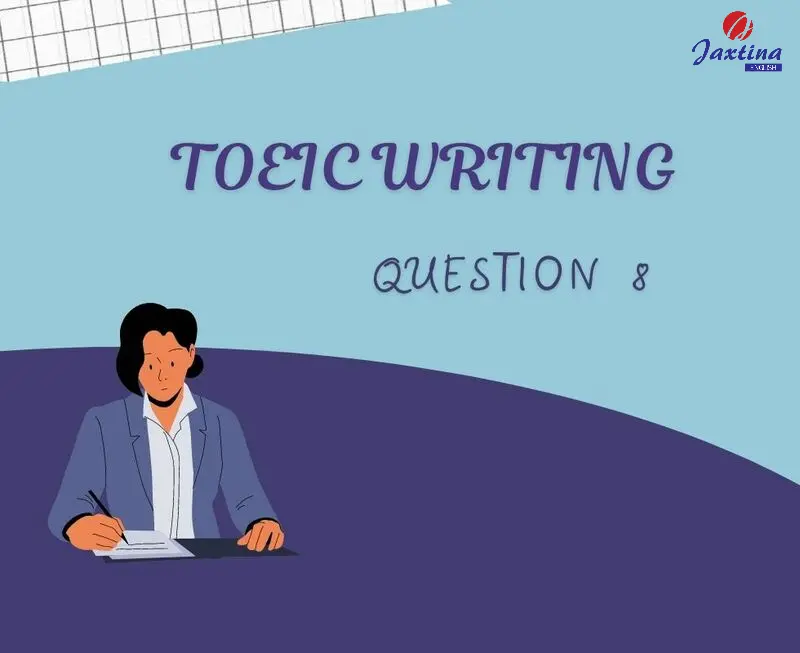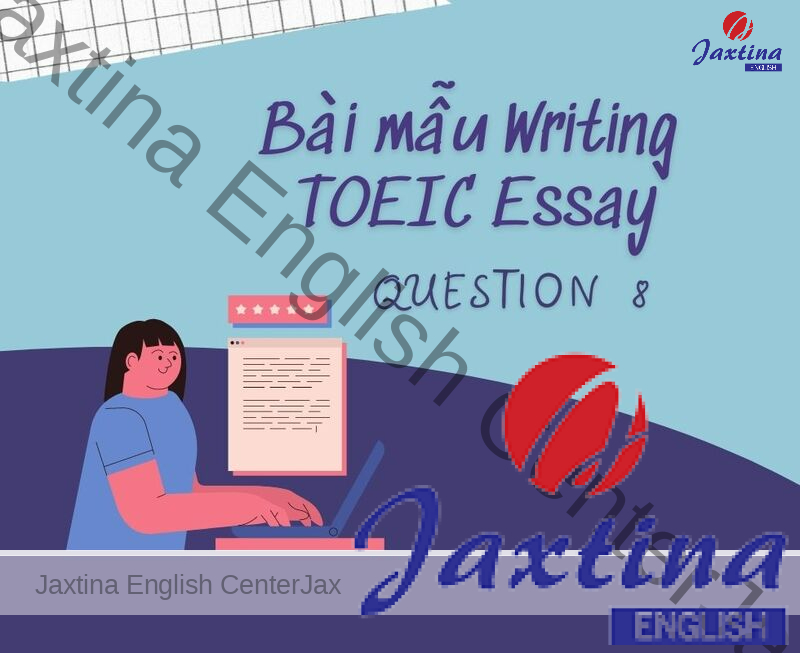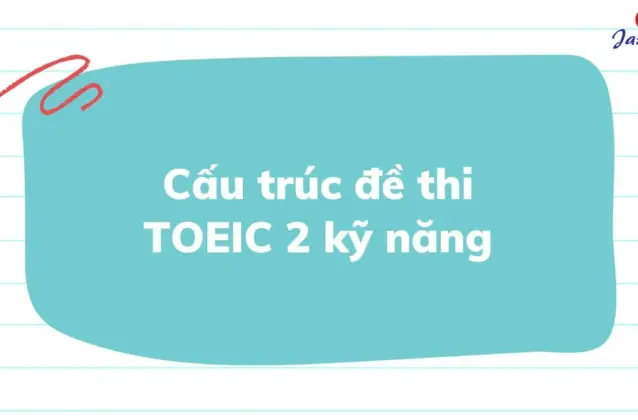



 07.03.2024
07.03.2024
 35 phút đọc
35 phút đọc 600 xem
600 xemTOEIC Writing Question 8 (hay được biết là TOEIC Writing part 3) yêu cầu viết một bài luận văn ngắn giải thích quan điểm của bản thân về một vấn đề được cho. Đây là phần thi khó nhất và yêu cầu cao về kỹ năng viết của người thi. Nếu bạn đang chưa biết bản thân cần làm những gì để vượt qua phần thi này hãy tham khảo bài viết dưới đây. Jaxtina sẽ chia sẻ về cách viết một bài tiểu luận ý (Opinion Essay) trong đề thi TOEIC Writing sao cho rõ ràng, rành mạch và thuyết phục.
>>>> Hữu Ích: Luyện thi TOEIC
TOEIC Writing Question 8: Write an opinion essay là phần thi cuối cùng của bài thi viết TOEIC (Part 3) yêu cầu thí sinh phải viết một bài tiểu luận để trả lời cho một câu hỏi trong đề bài. Bên cạnh đó, thí sinh cũng cần giải thích, chứng minh ý kiến của mình một cách rõ ràng.
Ví dụ: Many people often use public transport to move around the city. Others use their own cars. And what vehicle will you use? Please explain your answer, reasons, and specific examples. (Nhiều người thường sử dụng phương tiện giao thông công cộng để di chuyển quanh thành phố. Một số người khác thì sử dụng ô tô riêng. Còn bạn sẽ dùng phương tiện gì? Hãy diễn giải câu trả lời, các lý do và ví dụ cụ thể.)
Thông thường, một bài luận chuẩn sẽ chứa tối thiểu 300 từ và điểm số tối đa là 5 điểm. Bài luận sẽ được chấm điểm dựa trên các tiêu chí sau:
Bạn sẽ có khoảng 30 phút để lên outline, viết và sửa lại bài trước khi nộp. Do đó, hãy chú ý về mặt thời gian và không cần viết quá dài, chỉ tập trung vào đúng trọng điểm của bài luận.
>>>> Tham Khảo Thêm: Đề thi TOEIC Writing
Để hoàn thành phần thi Opinion Essay trong TOEIC Writing tốt nhất và tiết kiệm thời gian, bạn nên ghi nhớ và bám sát các bước sau đây:
Bạn cần đọc đề bài một cách kỹ lưỡng và hiểu rõ yêu cầu và xác định chủ đề chính trong câu hỏi. Sau đó, bạn cần xác định xem nên bày tỏ sự đồng tình hay không đồng tình với vấn đề được đặt ra để nêu quan điểm.
Bạn có khoảng 30 phút để làm bài thi TOEIC Writing Question 8. Do đó, bạn nên dành ra khoảng 3 – 4 phút để lên ý tưởng. Điều này sẽ giúp bạn tổ chức ý và viết một cách có cấu trúc hơn. Lưu ý: Cần xác định luận điểm chính, luận điểm phụ và các dẫn chứng, ví dụ để hỗ trợ quan điểm của bạn.
Ở đoạn văn mở đầu, bạn cần giới thiệu câu luận đề liên quan đến yêu cầu của đề bài. Ở câu luận đề, bạn phải làm sáng tỏ ý kiến của bản thân về chủ đề đã cho, vì vậy hãy tập trung tìm hiểu những cách diễn đạt thường được dùng khi trình bày ý kiến sao cho thu hút nhất.
Để trình bày lý do hoặc ý kiến bạn có thể dùng cụm sau:
Ví dụ: I think job satisfaction is the most important thing to take into account when choosing a career. (Tôi nghĩ rằng sự hài lòng trong công việc là điều quan trọng nhất khi lựa chọn nghề nghiệp.)
Ở phần thân bài, bạn sẽ phân thích hay giải thích quan điểm mà bạn đưa ra ở phần ở mở bài để làm sáng tỏ quan điểm của mình. Thông thường, bài luận sẽ trình bày từ 2 – 3 đoạn văn chính. Mỗi đoạn đều phải mở đầu bằng câu chủ đề (topic sentence) và sau đó bạn sẽ nêu những lý do, cơ sở cụ thể để hỗ trợ cho câu chủ đề đó.
Bạn có thể tham khảo những cách diễn đạt với trọng tâm là các liên từ thường được khi trình bày câu chủ đề (topic sentence) và các cơ sở cụ thể như sau:
Khi trình bày câu chủ đề bạn có thể dùng các liên từ để bắt đầu ở mỗi đoạn văn.
Khi nêu ví dụ hoặc giải thích lí do thì bạn có thể dùng các cụm:
Ở phần này, bạn sẽ kết luận lại những quan điểm mà bạn đã trình bày ở phần mở bài và thân bài để tạo sức thuyết phục với người đọc. Để viết kết luận thì bạn có thể dùng các cụm sau:
Sau khi viết xong, bạn cần đọc lại bài viết và kiểm tra lỗi ngữ pháp, chính tả, cấu trúc câu. Đảm bảo rằng bài luận không có lỗi sai cơ bản, trình bày ý có sự mạch lạc và dễ đọc, dễ hiểu.
Nắm chắc các phần ngữ pháp về cấu trúc câu, thì, liên từ, danh từ, động từ, trạng từ, tính từ. Học thêm cách sử dụng câu phức, câu điều kiện, câu ước, mệnh đề quan hệ, mệnh đề tương phản, mệnh đề quan hệ nguyên nhân – kết quả để trình bày quan điểm.
Trau dồi từ vựng liên quan đến các chủ đề thường xuất hiện trong TOEIC Opinion Essay. Chẳng hạn như: kinh doanh (Business), công nghệ (Technology), giáo dục (Education), xã hội (Society), văn hóa (Culture), và môi trường (Environment).
Đọc thêm từ điển tiếng Anh và các tài liệu khác để nắm vững cụm từ, thành ngữ và từ vựng chuyên ngành phù hợp với chủ đề tương ứng. Ví dụ như: Cambridge Advanced Learner’s Dictionary, Oxford Collocations, “OALD” Oxford Advanced Learner’s Dictionary.
Cập nhật thường xuyên các tin tức, vấn đề nổi bật trên toàn thế giới thông qua sách báo, nghe đài, xem youtube, xem tin tức…. Điều này sẽ giúp bạn có những ví dụ hoặc những dẫn chứng đầy sức thuyết phục cho chủ đề luận.
Đảm bảo bài luận (essay) có 3 phần hoàn chỉnh: Mở bài, thân bài, kết bài.
Ngoài ra, bạn cần phải biết cách sử dụng các liên từ (conjunctions) để kết nối các ý, đoạn văn lại với nhau. Như vậy, bài viết sẽ trở nên mạch lạc, dễ đọc và trôi chảy hơn.
| Loại câu hỏi | Mô tả |
| Advantage / Disadvantage (Thuận lợi / Bất lợi) |
Yêu cầu người viết lựa chọn thuận lợi hoặc bất lợi của một chủ đề và làm rõ quan điểm Ví dụ: Is working at a start-up company advantageous or disadvantageous? Give reasons and reasons to prove the point. (Làm ở công ty khởi nghiệp thì thuận lợi hay bất lợi? Đưa ra lý do và ví do chứng minh quan điểm.) |
| Preference (Ưu tiên) |
Đưa ra một số lựa chọn và yêu cầu người viết chọn thứ họ nghiêng về. Ví dụ: Some people like to live in apartments and some like to live in townhouses. What type of house do you prefer? Give examples to prove your point. (Một số người thích sống ở chung cư còn một số thì thích sống ở nhà mặt phố. Bạn thích ở loại nhà nào hơn? Đưa ra ví dụ chứng minh quan điểm.) |
| General Opinion (Quan điểm chung) |
Hỏi về quan điểm của người viết về một chủ đề. Ví dụ: What do you think about the issue of employees not being allowed to listen to music while working? Give reasons and examples to back up your point. (Bạn nghĩ thế nào về vấn đề nhân viên không được nghe nhạc trong lúc làm việc? Đưa ra lý do và ví dụ chứng minh quan điểm.) |
| Agree / Disagree (Đồng tình / Bất đồng) |
Hỏi người viết đồng tình hay không đồng tình về một phát biểu hay ý kiến, Bạn đồng tình hay phản đối với ý kiến sau: Nếu còn đi học thì đừng quan tâm sử dụng hàng fake hay real làm gì mà hãy biết quý trọng tiền bạc của ba mẹ (Bạn đồng tình hay phản đối với ý kiến sau: Nếu còn đi học thì đừng quan tâm sử dụng hàng fake hay real làm gì mà hãy biết quý trọng tiền bạc của ba mẹ) |
| Importance (Tầm quan trọng) | Yêu cầu người viết giải thích vì sao một thứ nào đó quan trọng với một số người nào đó.
Ví dụ: English proficiency is an important factor determining a person’s ability to get a job or salary. Do you think English ability is important to employees? Give reasons and examples. (Trình độ Tiếng Anh là yếu tố quan trọng quyết định đến khả năng được nhận việc hay mức lương của một người. Bạn thấy khả năng Tiếng Anh có quan trọng với người lao động không? Đưa ra lý do và ví dụ chứng minh.) |
Một số lưu ý khi làm phần thi này:
| Advantage/Disadvantage | Bạn cần đọc kỹ và xác định liệu đề bài chỉ yêu cầu trình bày những thuận lợi hoặc khó khăn hay trình bày cả hai. |
| Preference | Dạng này, bạn cần nắm rõ các lựa chọn mà đề bài đưa ra. Ví dụ như, liệu bạn đang chọn phương án phổ biến nhất, hữu dụng nhất, hay một lựa chọn nào khác. |
| Opinion, Agree/ Disagree, and Importance | Dạng này, bạn cần đọc kỹ quan điểm và tình huống mà đề bài đưa ra để thấy được mối quan hệ giữa chúng. |
Đây là ví dụ về một bài viết, câu hỏi thuộc dạng General opinion.
“At some jobs, employees are allowed to listen to music while they work. What is your opinion of this? Give reasons or examples to support your opinion.”
Some offices allow employees to listen to music, while others do not. I think that employers should not allow workers to listen to music at the office because it causes distraction, hurts teamwork and easily leads to disagreement.
(Dịch nghĩa: Một số văn phòng cho phép nhân viên nghe nhạc, trong khi những văn phòng khác thì không. Tôi cho rằng người sử dụng lao động không nên cho người lao động nghe nhạc tại văn phòng vì nó gây mất tập trung, ảnh hưởng đến khâu làm việc nhóm và dễ dẫn đến bất đồng quan điểm.)
To start with, I think that listening to music provides a distraction from employee’s work. This is bad because distracted employees can lead to bad customer service. I have witnessed several times that clerks were too busy listening to music on personal devices to give me a hand with some problems. These kinds of experiences have stopped me from shopping at certain stores. Therefore, I think if companies want to avoid losing customers, they should not allow their staff to listen to music while working.
(Dịch nghĩa: Đầu tiên, tôi nghĩ rằng nghe nhạc tại nơi làm việc sẽ gây mất tập trung cho nhân viên. Điều này thật tệ vì khi nhân viên mất tập trung có thể dẫn đến việc phục vụ khách hàng không tốt. Tôi đã chứng kiến nhiều lần cảnh nhân viên bán hàng quá bận rộn nghe nhạc bằng các thiết bị cá nhân dẫn đến việc không thể hỗ trợ tôi. Những trải nghiệm như thế này đã khiến tôi ngừng mua sắm tại một số cửa hàng nhất định. Vì vậy, tôi nghĩ rằng nếu các công ty muốn tránh việc mất đi khách hàng thì không nên cho phép nhân viên của mình nghe nhạc trong khi làm việc.)
Second of all, listening to music affects the effectiveness of teamwork. I have worked in places where employees were allowed to listen to music while they were working. People enjoyed music all day long and never even talked to each other. We have never worked or tried to solve problems together, which again could affect the quality of the work.
(Dịch nghĩa: Thứ hai, nghe nhạc làm ảnh hưởng tới hiệu quả làm việc nhóm. Tôi đã từng làm việc ở những nơi mà nhân viên được phép nghe nhạc khi họ làm việc. Mọi người nghe nhạc cả ngày và thậm chí không bao giờ nói chuyện với nhau. Chúng tôi chưa bao giờ làm việc cùng nhau hoặc cố gắng giải quyết vấn đề cùng nhau, điều này một lần nữa có thể làm ảnh hưởng đến chất lượng công việc.)
Finally, I think listening to music at work can lead to disagreement. The fact is, not everybody has the same taste in music. In cases where music is played over a loudspeaker, this could lead to arguments. That is what happened to my friend. At her workplace, they play country music over the loudspeaker all day. My friend hates country music, and she is really annoyed about having to listen to it all day. It makes her less productive and, thus, her work suffers.
(Dịch nghĩa: Cuối cùng, tôi nghĩ rằng việc nghe nhạc tại nơi làm việc có thể dẫn đến những bất đồng. Thực tế là không phải ai cũng có gu âm nhạc giống nhau. Trong trường hợp nhạc được phát qua loa, điều này có thể gây ra tranh cãi. Đó là những gì đã xảy ra với bạn tôi. Tại nơi làm việc của cô, họ chơi nhạc đồng quê qua loa cả ngày. Bạn tôi ghét nhạc đồng quê, và cô ấy thực sự khó chịu khi phải nghe nó cả ngày. Nó làm cho cô ấy kém năng suất hơn và do đó, công việc của cô ấy bị ảnh hưởng.)
To summarize, I think that it is a bad idea to allow employees to listen to music at work. Because allowing music in the workplace distracts employees, hurts teamwork, and leads to disagreement. In the end, it is important to remember that the workplace is for work, and people should listen to music at home.
(Dịch nghĩa: Tóm lại, tôi nghĩ rằng việc cho phép nhân viên nghe nhạc tại nơi làm việc là một ý kiến tồi. Bởi vì để âm nhạc ở nơi làm việc khiến nhân viên mất tập trung, ảnh hưởng đến tinh thần đồng đội và dẫn đến bất đồng. Cuối cùng, cần nhớ rằng nơi làm việc là để làm việc, và mọi người nên nghe nhạc ở nhà.)
Sau đây là 4 bài mẫu TOEIC Writing Question 8 (Part 3) để bạn tham khảo

Tổng hợp các bài luận Essay mẫu Writing TOEIC
Chủ đề: Most people would prefer to work for themselves rather than someone else. Do you agree with this statement? Use specific reasons and details to explain your opinion. (Hầu hết mọi người muốn làm việc cho chính mình hơn là một ai khác. Bạn có đồng ý với nhận định này không? Sử dụng lý do và chi tiết cụ thể để giải thích ý kiến của bạn.)
“I believe that, given the choice, almost everyone would opt to work for themselves rather than be an employee at a company. Being self-employed or running a business gives people independence, flexibility with their schedule, and, most importantly, reward for their efforts. It is for these reasons that most people dream of working for themselves.
First of all, most people would prefer to work for themselves because of the independence they could gain. Employees have to follow their boss’s instructions, even if they do not agree with them. However, self-employed people and those who run businesses have the freedom to make their own decisions. People who work for themselves find it incredibly liberating.
Secondly, being self-employed is appealing because people who work for themselves have the flexibility to manage their own schedules. Employees, though, have to work when their managers tell them to. I know from personal experience that it can be really difficult to organize simple things like bill payments when doing a full-time job. It is hard to get time during the day to attend to these matters. People who work for themselves, however, can fit these things into their schedules.
More importantly, most people would prefer to work for themselves in order to get the rewards they deserve. Most employees feel no great incentive to try hard at work because they usually receive the same amount of money regardless of their efforts. But the situation is totally different for self-employed people and those who run businesses. The harder they work, the more money they earn. Unlike normal employees, they are directly rewarded for their effort. Therefore, most people would rather work for themselves.
In sum, most people would rather be their own boss than work as employees if they could. Business owners have more independence, more flexibility, and receive greater rewards for their work than normal employees do.”
Chủ đề 2: Managing a team can be a very difficult job. In your opinion, what qualities make a good boss? Use reasons and examples to support your answer. (Quản lý một nhóm có thể là một công việc rất khó khăn. Theo bạn, những phẩm chất nào tạo nên một người sếp tốt? Sử dụng lý do và ví dụ để hỗ trợ câu trả lời của bạn.)
“People have different opinions about what makes a good boss. In my opinion, a boss needs to be approachable, knowledgeable and a good communicator. If managers possess these qualities, I think employees find it much more rewarding to work for them.
Firstly, a good boss should be approachable. When an employee has a problem that they need to discuss, they should not be too intimidated to talk to their manager. For example, I find it really helpful in my job that I can talk to my boss about personal issues I have with my colleagues or with clients. My manager can help me sort out these problems and get on with my work. On the other hand, some employers are difficult to talk to and can cause further problems for employees.
Secondly, it is important that a boss be knowledgeable. Employees need a boss who can monitor their work and give them advice on their specific projects. In order to do this, a manager needs to be very knowledgeable about the subject. In my previous job, for instance, my manager was an experienced marketing executive who could pass on excellent advice about particular projects and promotions.
Finally, a boss needs to be a good communicator. Employees need to know in advance about the work schedule and about changes in policy. More importantly, employees need to get honest advice and feedback from managers about their performance. I know that I find it really helpful when my boss lets me know about areas I need to work on and improve. When managers communicate clearly with employees, the entire team runs more smoothly.
In conclusion, I believe a good boss should be easy to talk to, knowledgeable, and good at communicating with employees. That way, employees will be able to enjoy working under their leadership.”
Chủ đề 3: What do you think a candidate should do to prepare for a job interview? Use specific examples and details to support your answer? (Bạn nghĩ một ứng viên nên làm gì để chuẩn bị cho một cuộc phỏng vấn xin việc? Sử dụng các ví dụ và các chi tiết cụ thể để hỗ trợ cho câu trả lời của bạn?)
“Candidates need to make sure they are relaxed and confident before going to a job interview. To prepare for the interview, they should try to contact someone at the company beforehand, dress as professionally as possible, and arrive on time.
To start with, it is a good idea for candidates to try and contact someone from the company before going to the interview. This way, candidates can find out more about the company and the specific role they are applying for. More importantly, though, it is an excellent way of establishing a personal connection with the company. This not only helps the candidates to feel more comfortable at the interview but it also might make the interviewer feel more positive towards that particular candidate as well.
Then, on the day of the interview, it is crucial that candidates put a lot of thought and effort into their appearance. The interviewer’s first impression of a candidate is largely based on appearance. Therefore, candidates need to look as neat, tidy, and professional at the interview as possible.
Similarly, it is important for candidates to make sure they arrive on time for the interview. The worst thing they can do at a job interview is to arrive late. It looks extremely unprofessional. Moreover, they will probably be rushing to get there, meaning they will be stressed and exhausted before the interview even begins. Instead, candidates should aim to get there well before time so that they can enter the interview room in a comfortable, confident and relaxed mood.
In summary, it is very important for candidates to make personal contact with the company beforehand, and to dress professionally, and be punctual on the day of the interview itself. This way, they will feel more comfortable and have a much better chance of leaving a positive impression with the interviewer.”
Chủ đề 4: Do you agree and disagree with the following statement? “Companies should give each employee the same benefits package. Use specific reasons and examples to support your opinion. (Bạn đồng ý hay không đồng ý với nhận định sau? “Các công ty nên cung cấp chế độ phúc lợi bình đẳng đối với tất cả nhân viên. Sử dụng lý do và các ví dụ cụ thể để hỗ trợ ý kiến của bạn.)
“Personally, I believe that companies should not give all employees exactly the same benefits package. In order to encourage loyalty to the company, improve employee performance and attract new recruits, employers need to be able to use a variety of benefits packages for their different employees. Basically, employers must be able to offer employee benefits at their own discretion.
Firstly, companies should offer different employees different fringe benefits so that they can foster employee loyalty. For instance, many companies give long-serving employees one or two weeks’ additional paid annual leave. These companies successfully use vacation benefits to reward employees who are loyal to the company. By offering these extra benefits, companies can encourage workers to serve longer terms.
Secondly, companies can use benefits to reward employee performance. Why should a hard-working employee and a lazy employee get exactly the same benefits? Instead, the company should have the discretion to offer benefits only to those workers who deserve them. This encourages all employees to work harder and improves the company’s performance overall.
Finally, companies can use different benefits to attract new employees. Sometimes employers offer attractive benefits to job candidates in order to get them to join the company. For instance, if a company urgently needs to hire customer service staff, it can offer an enticing range of benefits that employees in other departments do not receive, such as more vacation leave, higher overtime pay and so on. Being able to offer a variety of benefits packages is vital in the competition for talent.
In sum, companies should certainly be entitled to offer different benefits packages to different employees. Employers need to be allowed this discretion so that they can reward employee loyalty and performance. Moreover, employers must be able to adjust the fringe benefits that they offer on a case-by-case basis in order to recruit top talent.”
Như vậy, bạn đã vừa tìm hiểu về các bước làm bài Opinion Essay – TOEIC Writing Question 8 và bỏ túi thêm những bài mẫu writing TOEIC Part 3 cực hữu ích. Jaxtina English Center hy vọng những thông tin này sẽ giúp cho bạn tự tin và làm bài viết hiệu quả hơn. Nếu thấy thông tin này hữu ích thì bạn hãy chia sẻ kiến thức này cho mọi người cùng biết nhé!
Bài Viết Hữu Ích:
[custom_author][/custom_author]
Bài viết cùng chuyên mục

 10.08.2025
10.08.2025 18 phút đọc
18 phút đọc 150 xem
150 xem
Học TOEIC 1 kèm 1 chất lượng, cá nhân hóa tại Jaxtina…

 10.08.2025
10.08.2025 14 phút đọc
14 phút đọc 170 xem
170 xem
Cách học TOEIC cho người đi làm giúp tối ưu thời gian…

 05.08.2025
05.08.2025 40 phút đọc
40 phút đọc 177 xem
177 xem
TOEIC 2 kỹ năng: Tất tần tật những điều bạn cần biết
Để giúp bạn lựa chọn khoá học phù hợp,
tối ưu thời gian và chi phí nhất,
bạn hãy điền chính xác các thông tin bên dưới nhé!
Đăng ký thành công
Jaxtina đã nhận thông tin đăng ký của bạn.